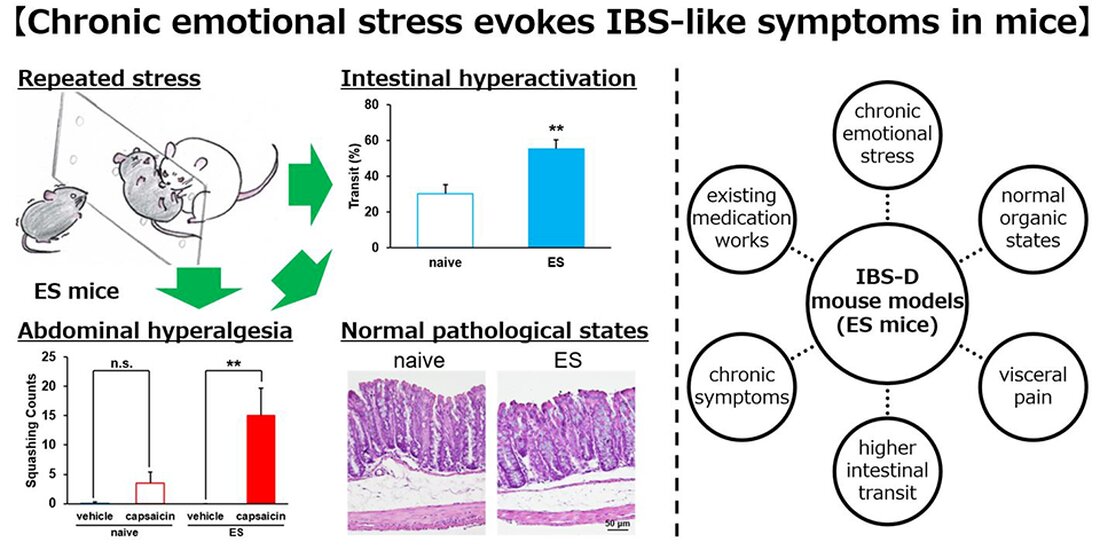Repeated emotional stress in mice provokes irritable bowel syndrome-like symptoms
Evidence linking emotional states and gut disorders has been growing recently. These findings have led researchers to speculate about the connection between the brain and the gut – the “gut-brain axis.” To understand this functional connection, researchers at Tokyo University of Science used a mouse model of stress-induced psychiatric disorders, called cVSDS, and found that the animals exhibited symptoms similar to irritable bowel syndrome as a result of repeated emotional stress. They found that emotionally stressed (ES) mice exhibited diarrhea-like symptoms and visceral hyperalgesia without histological changes in the intestinal tract, furthering the understanding of the gut-brain interactions that underlie IBS lie, a…

Repeated emotional stress in mice provokes irritable bowel syndrome-like symptoms
Evidence linking emotional states and gut disorders has been growing recently. These findings have led researchers to speculate about the connection between the brain and the gut – the “gut-brain axis.” To understand this functional connection, researchers at Tokyo University of Science used a mouse model of stress-induced psychiatric disorders, called cVSDS, and found that the animals showed symptoms similar to irritable bowel syndrome as a result of repeated emotional stress.

Sie fanden heraus, dass emotional gestresste (ES) Mäuse durchfallähnliche Symptome und viszerale Hyperalgesie ohne histologische Veränderungen im Darmtrakt aufwiesen, was dem Verständnis der Darm-Hirn-Interaktionen, die IBS zugrunde liegen, einen Schritt näher kam. Bildnachweis: Akiyoshi Saitoh
Irritable bowel syndrome (IBS) is often accompanied by gastrointestinal symptoms in the small and large intestines. IBS has been classified into four subtypes based on stool inconsistency; These are IBS with constipation (IBS-C), IBS with diarrhea (IBS-D), mixed (IBS-M) and unclassified IBS. However, there is a lack of understanding in the scientific literature about the mechanisms and treatments of IBS. One of the reasons for this lack of knowledge about IBS is the lack of useful experimental animal models.
Over the years, studies have suggested a connection between emotional states and gut dysfunction, emphasizing the existence and importance of the so-called “gut-brain axis” in determining our emotional and metabolic well-being. Recently, chronic social defeat stress (cSDS) and chronic vicarious social defeat stress (cVSDS) have been accepted as models of major depressive disorder (MDD) and posttraumatic stress disorder. Could cVSDS animal models help us understand IBS in detail? To find out, researchers at Tokyo University of Science (TUS), led by Professor Akiyoshi Saitoh of the Faculty of Pharmaceutical Sciences, TUS, used cVSDS mouse models. Their goal was to understand the effects of prolonged psychological stress on intestinal diseases. The team found that the psychological stress-induced mice showed higher intestinal transit ratio and behaviors related to visceral pain – hallmarks of IBS. Their results were published on October 6, 2022 in the journal Frontiers in Neuroscience.
Elaborating on their study, Prof. Saitoh says: "We focused on the cVSDS paradigm and assessed the effects of emotional stress on intestinal diseases. We further evaluated the potential of the paradigm as a novel animal model for IBS." In their study, they exposed mice to physical or emotional stress, in which the test animals either experienced physical aggression or witnessed the aggression for 10 minutes per day for 10 consecutive days. On day 11, a social interaction test was performed to evaluate the stress conditions of the test animals. Stress was also estimated by plasma corticosterone quantification, charcoal meal test and capsaicin-induced hyperalgesia test of the animals. The researchers also assessed the mice for intestinal permeability, pathology, defecation frequency and stool content.
Neuroscience eBook
Compilation of the top interviews, articles and news from the last year. Download a free copy
They found that the carbon transit ratio, indicating passage through the intestine, was significantly increased in mice exposed to emotional stress compared to mice in the (naïve) control group that were not exposed to stress. However, in mice exposed to physical stress, the effects were insignificant. The frequency of defecation and the stool water content were also increased in emotionally stressed mice. These effects lasted 1 month after stress exposure. Furthermore, there were no significant differences in pathological status and intestinal permeability between the naive and emotionally stressed mice, suggesting that there are no stress-related changes at the tissue level.
“These results suggest that chronic stress in mice causes IBS-D-like symptoms, such as chronic intestinal peristaltic exacerbations and abdominal hyperalgesia, without intestinal lesions.”
Professor Akiyoshi Saitoh, Faculty of Pharmaceutical Sciences, TUS
Interestingly, the researchers found that changes in intestinal motility in the test animals were improved when the cVSDS mice were treated with Keishikashakuyakuto, a Kampo drug used clinically to treat IBS.
The study highlights the advantage of the cVSDS paradigm over traditional methods in inducing IBS-D-like symptoms through repeated psychological stress. Regarding the mechanisms of these effects, Professor Saitoh suspects: "From a gut-brain axis perspective, we suspect that the insular cortex plays an important role in determining the phenotype of emotionally stressed mice." The insular cortex is a part of the upper central nervous system that controls digestive functions and is involved in coping with psychological stress.
In conclusion, this study shows for the first time that cVSDS-induced psychological stress alone can cause IBS-D-like symptoms in mice. Further research could perhaps rely on cSDS and cVSDS paradigms to elucidate pathophysiological conditions and design treatments for IBS.
Source:
Reference:
Yoshioka, T., et al. (2022) Repetitive psychological stress, chronic vicarious social defeat stress, elicits irritable bowel syndrome-like symptoms in mice. Frontiers in neuroscience. doi.org/10.3389/fnins.2022.993132.
.

 Suche
Suche
 Mein Konto
Mein Konto
